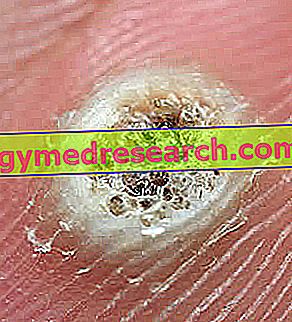Generality
The ginger decoction is a liquid preparation obtained from the rhizomes of the same plant.

Numerous properties are ascribed to this particular type of preparation, attributed to the richly contained active ingredients in the rhizome. The latter, in fact, constitutes the plant's drug, ie it represents that part of the plant used (pure or treated) for therapeutic purposes (approved or not).
However, as will be seen in the course of the article, through the decoction operation it is not possible to extract all the active ingredients, consequently also the final properties of the preparation will be lower than those of the whole or powdered rhizome.
Despite this, many people resort to using ginger decoction to alleviate certain disorders that mainly affect the gastrointestinal tract.
Please note
The ginger decoction should not be confused with the ginger infusion. In fact, although it is always a liquid preparation obtained from the rhizome of the plant, the process for its preparation is totally different, just as the quantity and quality of the extracted active ingredients can be different.
Preparation
How to prepare the ginger decoction?
The ginger decoction is prepared through the so - called decoction process .
First of all, it is necessary to prepare the drug, that is the rhizome of the ginger. Now it is a product that is easily available at the supermarket, where it is sold fresh. Once you have procured the main ingredient, you can proceed as follows:
- Cut the ginger rhizome into round slices. To prepare a cup of decoction (approximately 250 ml of water) should be enough 3-4 washers.
- Dip the washers in cold water and bring to boiling.
- Boil the water-rhizome ginger mixture for 15-30 minutes.
- After this time, stop the heating and let it cool a little.
- Finally, filter the ginger decoction thus obtained by using a sieve.
- Sweeten to taste (for example, with brown sugar, honey or maple syrup) and drink the still hot decoction.
If you want to prepare larger quantities of ginger decoction, the recommended dose for a liter of water is about 30 grams of fresh rhizome.
Did you know that ...
If the ginger decoction is prepared using the dried and powdered rhizome, theoretically, a greater "therapeutic" effect should be obtained. However, before resorting to the use of ginger - both fresh and dried - it would be good to ask your doctor for advice, in order to exclude the presence of any contraindications to taking the preparation in question.
Decoction: an extraction with water
The preparation of the ginger decoction basically consists in carrying out a hot extraction of the active ingredients contained within the rhizome of the plant, using water as a solvent.
The decoction operation is a more energetic extraction than the one obtained with the infusion and, for this reason, it is particularly suitable for extracting active ingredients from substantial drugs, such as roots, barks and rhizomes, within which the water could hardly penetrate. However, due to the prolonged heating at high temperature, with the decoction the integrity of any thermolabile substances can be compromised.
Furthermore, given the solvent used, the active ingredients that will be extracted will be predominantly hydrophilic in nature; while any active principles of a hydrophobic nature will not dissolve in water, except in paltry quantities.
Therefore, the decoction does not allow to know the quantity and quality of the active substances extracted.
To learn more: Decotto »storage
How is the Decoction of Ginger Preserved?
The ginger decoction is an extemporaneous preparation and must be prepared and consumed at the time. However, should the ginger decoction not be taken immediately, it should be stored in the refrigerator for up to 24 hours.
Features and Properties
What are the characteristics and properties attributed to the Decoction of Ginger?
The ginger decoction is a yellow-orange liquid preparation with more or less dark shades, variable according to the type and quantity of rhizome used.
The flavor of the ginger decoction, naturally, recalls that of the rhizome of the plant, therefore, it could be defined as spicy and pungent.
The properties attributed to the ginger decoction are mainly digestive and "warming" and are attributable to the gingerols contained in the rhizome and extracted, in part, through the decoction.
These properties, moreover, have been confirmed by various studies, so much so that the German Commission has officially approved the use of ginger to combat dyspepsia.
Other properties attributed to the ginger decoction are the anti-inflammatory properties, however not adequately confirmed, to which are added hypothetical expectorant properties attributed to it by folk medicine. For this reason, the decoction of ginger is used by traditional medicine for the treatment of cooling disorders.
Curiosity
In popular medicine, the ginger bark is also used for the preparation of decoctions that are used as natural remedies against fever (however, the febrifugal properties of ginger have not been confirmed).
Decoction of Ginger against Nausea and Vomiting
According to some, the decoction of ginger would also be effective in preventing and countering nausea and vomiting, in particular, those caused by motion sickness. In truth, this belief is not entirely true. In fact, although it has been scientifically proven that the extracts obtained from the ginger rhizome - standardized and titrated in gingerols - are actually able to control the aforementioned disorders, the same cannot be said of the ginger decoction. With the decoction, in fact, it is not possible to extract the sufficient quantities of active ingredients necessary for carrying out a similar therapeutic activity. Therefore, it is not possible to know how many and which active ingredients are being taken.
If you wanted to use ginger against nausea and vomiting, therefore, it would be better to use powdered and standardized gingerol drugs. In this regard, it is noted that there are numerous ginger-based food supplements in the form of capsules or tablets that are suitable for the treatment of these disorders.
The use of the ginger decoction, on the other hand, remains indicated in the case of mild digestive disorders (long and difficult digestion, belching, stomach swelling, meteorism, borborigmas, etc.).
Action mechanism
How does the ginger decoction work to aid digestion?
As mentioned, the main activity of the ginger decoction is to favor the digestive processes by counteracting the disorders associated with slow and laborious digestion. The people responsible for this action are the gingerols which, once ingested, are able to favor the production of gastric juices and to stimulate intestinal peristalsis .
dosage
When and How much Decoction of Ginger Assume?
To counteract the digestive problems associated with symptoms such as flatulence, meteorism, borborigmi, belching, stomach swelling, etc., it is generally recommended to take a cup of ginger decoction (preferably freshly prepared) after the main meals.
Please note
Although it is a natural remedy, as will be seen in the following chapters, the intake of the ginger decoction is not without side effects and may be contraindicated in some situations.
Moreover, in some cases, the presence of digestive disorders could be connected to the presence of any underlying pathologies not yet diagnosed.
For all the aforementioned reasons, before taking ginger decoction for the treatment of digestive disorders or any other ailment, it is good to ask for the preventive advice of your doctor.
Pregnancy and breastfeeding
Can the ginger decoction be taken during pregnancy and during breastfeeding?
Although some claim that the ginger decoction can be used to counteract the pregnancy nausea, the use of this preparation or any other ginger-based preparation is contraindicated during gestation and, as a precaution, even during lactation.
In reality, there are not enough studies able to fully confirm a possible negative effect of the ginger decoction against the fetus or the pregnant woman; on the other hand, however, there are no studies that can confirm its safety. Furthermore, as already seen in the article, the ginger decoction was not effective in counteracting nausea and vomiting.
For all these reasons, pregnant women and breastfeeding mothers should not take ginger or its derivatives without asking the advice of their doctor or gynecologist.
Side effects
What Side Effects Can Ginger Decoction Cause?
Paradoxically, the main side effects that can derive from the intake of the ginger decoction to counteract digestive disorders, concern the gastrointestinal system. More specifically, the decoction of ginger could promote the onset of heartburn and diarrhea .
Not to be forgotten, then, the possible appearance of allergic reactions in sensitive individuals.
Contraindications
What are the Contraindications of the Ginger Decoction?
As for the contraindications of the ginger decoction - although the amount of extracted active ingredients is not too high - it is very likely that the same contraindications apply to the intake of ginger or its concentrated extracts. Therefore, taking the ginger decoction is generally contraindicated in the following situations:
- Patients suffering from stomach acid;
- Patients suffering from cholelithiasis;
- Patients in therapy with anticoagulant, antidiabetic and / or calcium channel blocking drugs;
- In pregnancy and during lactation.
If you find yourself in one or more of the above situations, before taking the ginger decoction, you need to consult your doctor.



